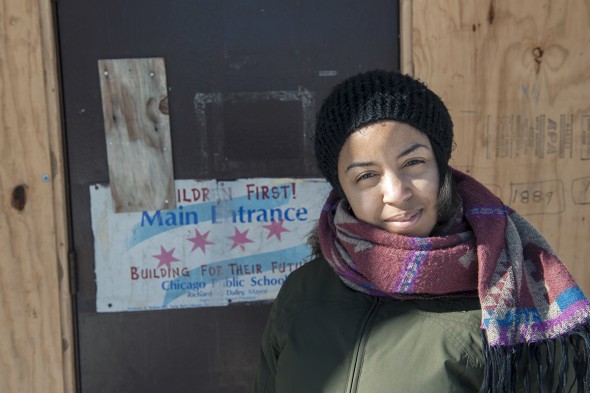Believing in the power of community

Grad student Cecile Carroll was appointed to the Chicago Education Facilities Task Force. Photo: Roberta Dupuis-Devlin/UIC Photo Services
Graduate student Cecile Carroll wants the Chicago Public Schools to be more accountable for its decisions to close city schools.
For her outspoken advocacy, she was named to the Chicago Educational Facilities Task Force — one of a dozen people on the task force, including representatives of three community groups, the school system and six legislators.
“We helped write legislation to make CPS do long-term planning over all its buildings,” she said. “We’re the only big city that doesn’t do this.”
One focus for Carroll has been to create a process for repurposing the closed schools.
“I want residents to be able to make the decisions and not have these be top-down decisions,” she said.
“I think it should be based on dialogue about the needs in the community and how the building could address some of them.”
Carroll, a master’s student in the College of Urban Planning and Public Affairs, was awarded a fellowship from the Chicago Community Trust.
“I’m looking at low-income communities and how they do planning with their residents,” she said.
Her research has taken her from St. Louis and Kansas City to New York and Puerto Rico, where she learned more about a group of residents “who won the largest land trust in U.S. territory,” more than 300 acres.
“In preparation, they created resident-run business subsidiaries for housing, development, sewage treatment and recycling,” Carroll said.
“It’s great residential empowerment through planning.”
The fellowship financed her travel and paid for a part-time worker to fill in for her at Blocks Together, the West Humboldt Park organization where she is co-director and community organizer.
In February 2012 she led a group that locked itself inside Piccolo Elementary School in Humboldt Park for 22 hours “with no food — that was fun,” Carroll said.
They were protesting the school board’s decision to make Piccolo a “turnaround” school, replacing the staff and turning its management over to a nonprofit organization, the Academy for Urban School Leadership.
The protest failed to stop the plan, “but we did a really good job of getting people to ask, ‘Why would you do that to a school?’” Carroll said.
Last April she led a group of 30 parents to City Hall to demand that Mayor Rahm Emanuel do walk-throughs of communities where schools were being closed. “He never did,” she said.
Carroll, who is in her last semester for a master’s degree in community development, would like to continue working as a community organizer, with particular attention to “how schools impact community development,” she said.
“I’ve seen how schools are anchors for local capacity building,” Carroll said. “Parents get their GEDs, training and do social networking in their children’s schools.”
She plans to do community organizing in her own neighborhood, Englewood, working with the Resident Association of Greater Englewood and applying “best practices” learned in her West Humboldt Park work.
Carroll grew up in Washington Park, on the South Side.
She earned her bachelor’s degree at Temple University in Philadelphia, choosing Temple because “they have a great communications program, and I came out of high school wanting to be a journalist,” she said.
“But college activism changed my life.”
She worked to change Temple’s admissions policy to welcome more minority students and helped establish an office of multicultural affairs for the school.
Carroll sings in a Christian band at New Life Berwyn Community Church that includes three singers, a guitar, drums and occasionally a piano.
“We rock out on Sundays,” she said.
Her husband, Angelo De Mello, is a mental health associate who works with teenage boys. They have an 8-year-old daughter, Nayeli, and 3-year-old son, Angelo II.
“My husband and I want to do a community block garden this summer,” she said. “We just applied for the lot; it’s a vacant lot next to our house.”
On top of all her other activities, she recently started a blog.
“It talks about my own journey as an Englewood mother and organizer,” she said.
Categories
Topics
